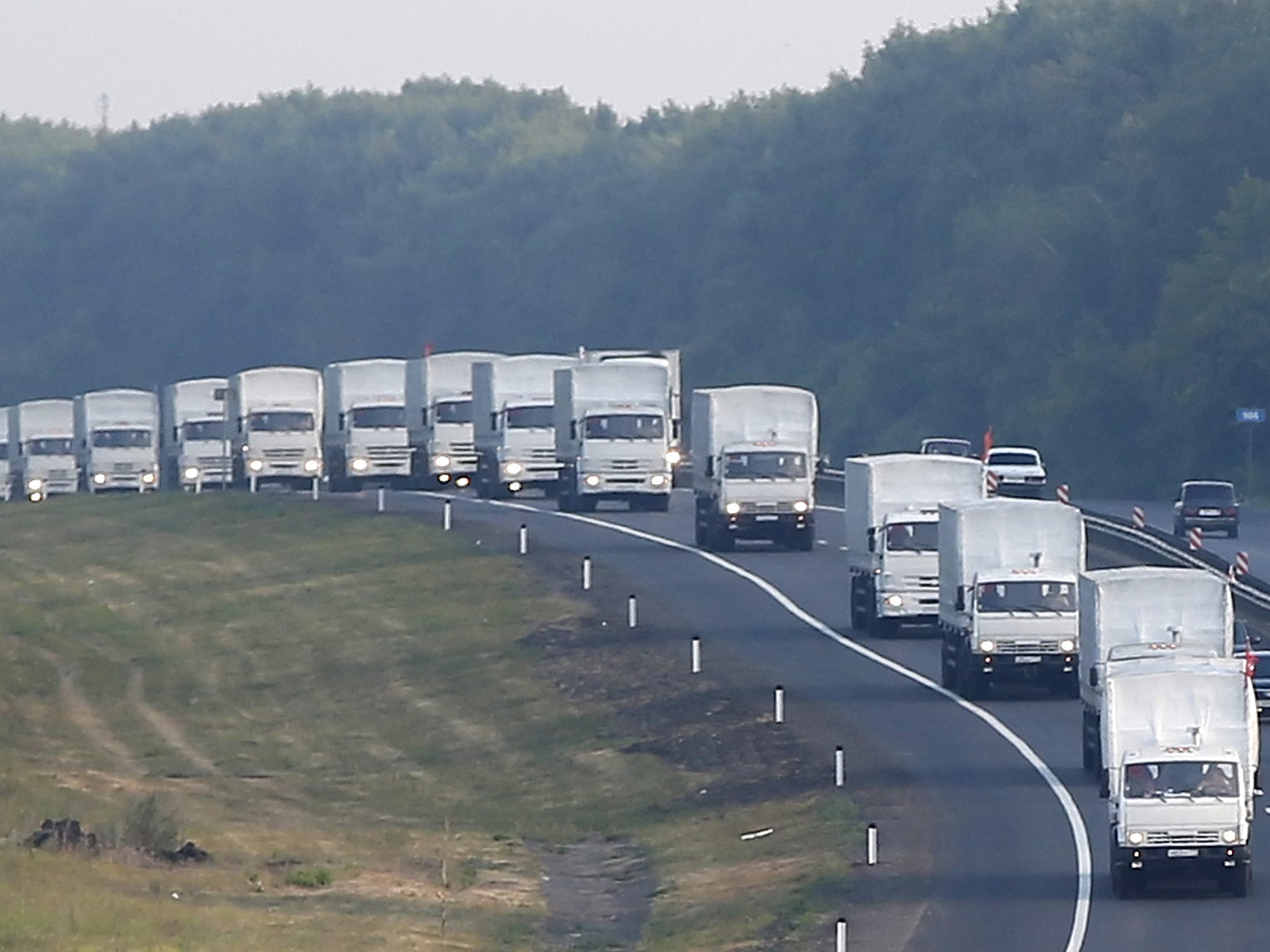Ukraine crisis: British Government 'very alarmed' at reports of Russian armoured personnel carriers crossing into Ukraine
The accusations came as a separate Russian aid convoy was inspected

Your support helps us to tell the story
From reproductive rights to climate change to Big Tech, The Independent is on the ground when the story is developing. Whether it's investigating the financials of Elon Musk's pro-Trump PAC or producing our latest documentary, 'The A Word', which shines a light on the American women fighting for reproductive rights, we know how important it is to parse out the facts from the messaging.
At such a critical moment in US history, we need reporters on the ground. Your donation allows us to keep sending journalists to speak to both sides of the story.
The Independent is trusted by Americans across the entire political spectrum. And unlike many other quality news outlets, we choose not to lock Americans out of our reporting and analysis with paywalls. We believe quality journalism should be available to everyone, paid for by those who can afford it.
Your support makes all the difference.A column of Russian armoured personnel carriers has been seen crossing into eastern Ukraine despite official denials of a military presence.
A Guardian journalist photographed one of the 20 vehicles, which carried official Russian military plates, travelling towards Ukraine from the Russian town of Donetsk, 130 miles from the rebel-held Ukrainian city with the same name.
The convoy reportedly waited for nightfall before entering Ukraine along a dirt track through a gap in the border’s barbed wire fence.
Andriy Lysenko, a spokesman for Ukraine's security council, also claimed the Russian military vehicles crossed into the country- a charge Russia denied.
Philip Hammond, the Foreign Secretary, said he was "very alarmed" by the reports.
"If there are any Russian military personnel or vehicles in eastern Ukraine they need to be withdrawn immediately or the consequences could be very serious," he added.
Nato's Secretary General, Anders Fogh Rasmussen, later said there had been a "Russian incursion" into Ukraine but stopped short of characterising it as an invasion.
Russia's Federal Security Service said Russian forces were patrolling the border area but denied that military vehicles had moved in.
The Ukrainian administration is likely to view the personnel carrier sightings as confirmation of their long-held conviction about a Russian military incursion and the country's support for militants.
Government forces have not controlled the area for months, losing it to the self-proclaimed Donetsk People’s Republic and other pro-Russian paramilitary groups.
In April, Crimea was annexed with ease by the Kremlin, after a disputed referendum and the occupation of the peninsula by pro-Russian forces.
A German government spokesman, Steffen Seibert, said the accusation of Russian military vehicles crossing the border was very serious.
"It is very clear that if this report turns out to be true, Russia would be urgently called upon to withdraw these vehicles across its border at once," he said.
Ukrainian politicians had already raised concerns about an aid convoy of more than 200 lorries due to arrive on Friday.
A tentative agreement has seen the shipment enter through a government-controlled checkpoint near Donetsk and inspected by the international Red Cross.
Ukraine said its 41 border service officials and 18 customs workers began the inspection on Friday in the presence of aid agency representatives.
Russian news agencies said Russia was prepared to present all necessary documentation and to hand over the cargo to the Red Cross.
Such an inspection would ease concerns that Russia could use the aid shipment as cover for a military incursion in support of the separatists.
Russian officials said it was full of vital supplies ranging from baby food to sleeping bags for civilians facing crisis after months of fighting between government troops and militias.
Kiev has also announced its own aid shipment to the war-ravaged region of Luhansk, where almost 250,000 people have been without water or power for nearly two weeks.
The conflict has killed more than 2,080 people, according to the UN's human rights office in Geneva, and left many more desperately short of food, water and medical aid.
A spokesperson said at least 4,953 others have been wounded in the fighting since mid-April, with more than 60 people a day being killed or wounded as part of "a clear escalating trend" of violence.
Additional reporting by AP
Join our commenting forum
Join thought-provoking conversations, follow other Independent readers and see their replies
0Comments